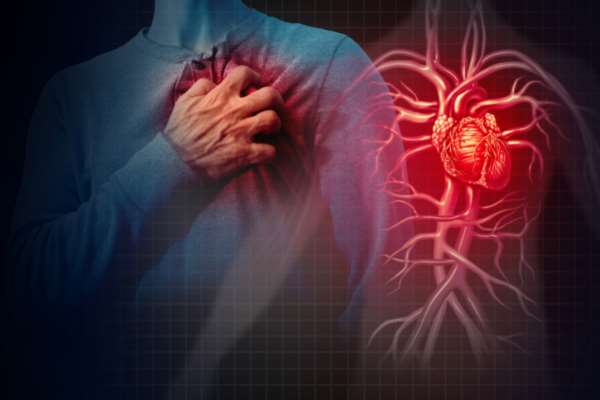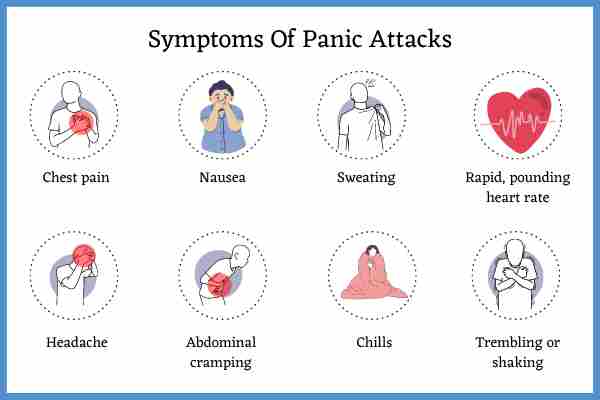Popularly known as the Prince of Preachers, Charles Spurgeon once said, “Anxiety does not empty tomorrow of its sorrows, but only empties today of its strength.”
Panic attacks and anxieties, are they the same? Or are they different? The truth is that anxiety and panic attacks are similar because they both cause the person to feel fear. The only difference is that anxiety builds up slowly or gradually, while panic attacks come abruptly (quickly, immediately, etc.).
Do you know that pretty much anyone can suffer from a panic attack? Anxiety Disorders Association of America (ADAA) reports that in 2020, 6.8 million adults will be diagnosed with generalized anxiety, while 6 million adults will be diagnosed with panic disorder. These statistics show that millions of people are dealing with panic attacks yearly.
I have often been asked questions like, “What are panic attacks?”, “how to reduce anxiety”, “how to manage panic attacks”, “Can you stop panic attacks forever”, “Can you control panic attacks” etc. Here are some of the questions that sufferers of panic attack disorder have asked themselves. Do you have similar questions? Then you’ve come to the right place because, in this article, you’ll learn what panic attacks are and how to prevent them and manage your general anxiety. To find out more, continue reading.
Understanding Panic Attacks
A panic attack is a sudden episode of intense fear resulting in severe physical reactions, especially when there’s no apparent cause or danger.
Panic attacks are surprisingly common, and around 13% of people are likely to experience one in their lifetime. On the other hand, anxiety attacks are frightening, and when they occur, you might think that you have a heart attack, are losing control, or even dying.
Many people may experience anxiety attacks once or twice in their lifetime, especially after the situation causing them to panic ends. In contrast, others continue to have unexpected, recurrent anxiety attacks and spend long periods in constant fear of experiencing another attack. If you fall into the latter category, you are experiencing a condition known as a panic disorder.
Most anxiety attacks last for a period of 5 to 20 minutes. This is because anxiety attacks are instantaneous, and their symptoms are often at their worst within 10 minutes. However, the time duration isn’t limited to that, as you can experience the symptoms of an anxiety attack over a more extended period. If that should happen, it’s most likely because you are experiencing other anxiety symptoms or a second anxiety attack.
Symptoms Of Panic Attacks
Panic attacks occur suddenly without prior warning. They can happen at any time, and it doesn’t matter whether you are at the mall, driving your car, in a business meeting, or asleep. Anxiety attacks have different variations, and they all peak within minutes.
The most common or primary symptom of anxiety attacks is experiencing sudden, intense fear and anxiety. The other symptoms of anxiety attacks include:
– Sense of impending danger or doom
– Rapid, pounding heart rate
– Trembling or shaking
– Chills
– Nausea
– Chest pain
– Dizziness, light-headedness, or faintness
– The feeling of unreality or detachment
– Fear of death
– Loss of control
– Sweating
– Tightness in your throat (even shortness of breath)
– Hot flashes
– Abdominal cramping
– Headache
– Numbness or tingling sensation
The symptoms of panic attacks and panic disorders often begin in early adulthood or late teens, affecting more women than men.
What Causes Panic Attacks?
The main cause of panic attacks or panic disorders hasn’t been found yet, but the following factors could play a significant role in causing you to experience them.
– Major stress
– Temperaments that are more prone to negative emotions or sensitive to stress
– Genetics
– Specific changes in the way sections of the brain function
Also, certain factors can increase the risk of developing panic disorders. These factors are:
– A family history of panic disorder or anxiety attacks
– A traumatic event—such as a severe accident or the death of a loved one
– Excessive caffeine intake or smoking
– Significant life stress—such as the severe illness or death of a loved one
– Major changes in your life—such as welcoming an additional baby or undergoing a divorce
– History of childhood serial or physical abuse
Initially, anxiety attacks happen instantaneously without warning, but they tend to become triggered by specific situations as time goes by.
However, some research suggests that the body’s natural flight or fight response to danger is a part of anxiety attacks. For example, let’s say a lion is chasing you. You will react instantly, and your breathing and heart rate will increase as your body prepares for a life-threatening situation. Many such reactions occur when you panic. But it’s still unknown why such reasons would occur when there is no obvious danger.
Panic Attacks- How to Manage Them
Panic attacks, panic disorder, and anxiety disorder, if left unchecked or untreated, can affect almost every area of your daily life. Sometimes, even your self-awareness and self-confidence are not left unscathed.
Living a life where you are constantly afraid of panicking could result in the following complications:
– Development of specific phobias, which could be the fear of leaving your home or driving
– Start avoiding social situations
– Depression, anxiety disorders, as well as other psychiatric disorders
– Alcohol or any other substance misuse
– Problems at school or work
– Increased risk of suicidal thoughts or suicide
– Financial problems
Even though panic attacks are not life-threatening, leaving them untreated is still not safe. Cognitive Behavioural Therapy can instead be used to treat panic disorders. CBT is a type of psychotherapeutic treatment that teaches people how to identify and change disturbing or destructive thought patterns that can negatively influence emotions and behaviour. CBT treatments are extremely effective in treating panic disorders, and about 80% of individuals who complete the CBT course end up being panic-free.
Besides undergoing a CBT treatment to cure panic disorders, there are certain things you can do on your own to manage them. That’s why I’ll also be sharing tips on how to deal with panic attacks on your own.
- Practice Deep Breathing
Scientists found that slow breathing can improve a person’s sense of alertness, comfort, and relaxation and reduces symptoms of confusion, arousal, anxiety, anger, and depression.
Even though hyperventilating is a symptom of a panic attack that increases fear, deep breathing can reduce the symptoms of the attack when practised during a panic attack. If you can control your breathing, you’ll be less likely to experience hyperventilation, which makes both the attack and other symptoms worse.
To practice deep breathing properly, get out of your head, calm your mind, and take deep breaths into and out of your mouth. Feel the air slowly fill your chest and your belly before slowly releasing it. While taking in the air, breathe in for a count of four, then hold the air for one second and then breathe out for a count of four. Perform the breathing exercise repeatedly until you feel better.
- Practice Mindfulness
Mindfulness is a practice that helps ground you into the reality of what is around you. It fights anxiety attacks as it happens or approaches since anxiety attacks can cause separation from reality or a feeling of detachment.
In mindfulness, you focus your attention on the present (feeling your jeans, digging your feet into the ground, etc.), recognize your emotional state, and meditate (you can meditate on positive affirmations) to help you relax and reduce stress.
Experts believe that mindfulness strategies like meditation can help people manage anxiety symptoms. However, further research is needed in that area as it’s still unclear whether it can treat an underlying anxiety disorder.
- Perform Light Exercises
Research has revealed that performing regular exercise (aerobic exercise, walking, etc.) doesn’t only build your body or keep it healthy. It also boosts your mental well-being.
Experts have discovered that exercising from 60% – to 90% of your maximum heart rate for 20 minutes three times a week can help you reduce or manage anxiety. However, suppose you aren’t used to exercising. In that case, you can talk to your doctor before starting. In addition, some evidence states that starting aerobic exercise afresh may trigger additional anxiety in people who have or are struggling with an anxiety disorder.
While exercising, if you are hyperventilating, feel stressed, struggle to breathe, stop exercising (take a break) or you can choose a more moderate option such as yoga, swimming, or walking.
Conclusion
Panic attacks happen suddenly, and there isn’t a straightforward thing that you can do to determine when it will happen. Even though panic attacks are not life-threatening, leaving them unchecked or untreated for a long time can cause serious complications.
Anxiety attacks are frightening. While some people may experience it once or maybe twice in their lifetime, and some may not experience it at all, others experience it more frequently than the other categories of people.
The fear of panic attacks can even lead to more fits of terror. Hence, it becomes necessary that once you start panicking frequently or regularly that you talk to your doctor about it or try out the tips mentioned above to manage them.
Counselling and Psychotherapy are proven aids to help move from anxiety and panic attacks.















